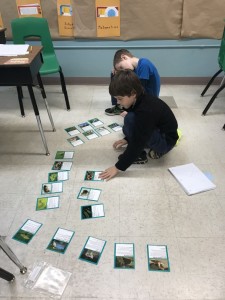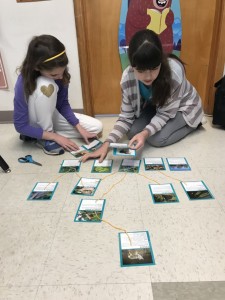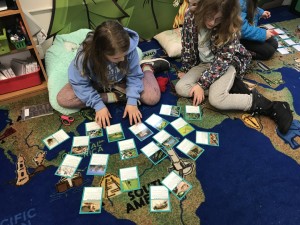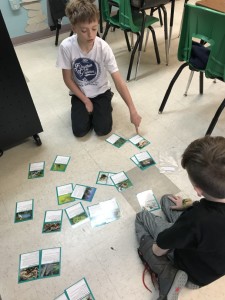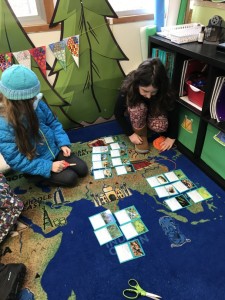Literatura
This week we finished reading our non-fiction piece La revolucion estadounidense. After discussing and summarizing the main ideas of the text, we focused on organizing and categorizing information (this skill transferred directly to our science studies), as well as providing examples of cause and effect situations drawn from the story. These are very significant reading and comprehension skills. Students did an excellent job identifying and explain these situations applying accurate vocabulary and structure in Spanish both, orally and in written form. Also in literacy, we continued to work on our regular spelling, grammar, usage and mechanics routines (literacy packets).
Towards the end of the week, students were introduced to a new writing project we will be working on the next couple weeks! We are all so excited about this new project. More information to come, please stay tuned!
Ciencias
Is planet Earth a system? What happens when compost worms interact with organic litter?
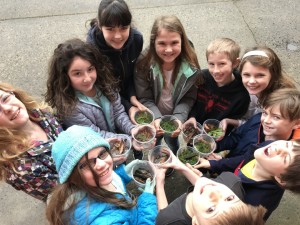 This week students continued to explore Earth as a system. Students focused on the biosphere and described ecosystems by looking at feeding relationships and energy transfers, described as food webs. Each group of students set up a redworm habitat system to study detritivores. They will record what organic materials go into the habitat with about redworms and will observe and document changes in the worm jar over the next weeks.
This week students continued to explore Earth as a system. Students focused on the biosphere and described ecosystems by looking at feeding relationships and energy transfers, described as food webs. Each group of students set up a redworm habitat system to study detritivores. They will record what organic materials go into the habitat with about redworms and will observe and document changes in the worm jar over the next weeks.
Key concepts discussed :
- Food webs are subsystems within ecosystems. They describe the transfer of matter and energy within the system.
- Food webs are made up of producers (organisms that make their own food), consumers (organisms that eat other organisms to obtain food), and decomposers (organisms that consume and recycle dead organisms and organic waste).
History & Geography
This week we began learning about European explorers.
Our objectives were:
- Describe the location of the Spice Islands.
- Explain why spices were valuable to Europeans.
- Summarize how Marco Polo’s journey served as an inspiration for European exploration.
- Explain why Europeans needed spices
- Identify new technologies that allowed Europeans to launch voyages of exploration.
- Explain why Portugal launched missions of exploration.
- Summarize the voyages of Bartolomeu Dias, Vasco da Gama, and Pedro Cabral.
Mathematics
This week we completed our unit on Area of a Triangle.
Our objectives were:
- Identify the base given the height of a triangle
- identify the height given the base of a triangle
- Find the area of a triangle given its base and its height
English Word Work
This week we completed our rotation.
Our rotation days were:
- Vocabulary Day:
- Spelling City:
- Writer’s Workshop:
- Blind Sort Test:
Specialists
- Someone who likes to tell everyone what to do and how to do it.
- Someone who is often a leader but can not control the urge to bluntly tell others what to do.
- The student is not aware of their bossiness, it’s an automatic behavior.
- Someone who feels it’s their job or responsibility to make sure others get everything done.
- It does not matter if someone else was assigned the role of leader, this student will assume the role of the boss.
- Other students may follow this student, but eventually will complain about the bossiness.
- Other students may avoid being in a group with this student.
We had a great discussion on how we can help a friend realize they’re being bossy and instead be a leader.
- Leaders SHOW by example instead of telling others what to do.
- Leaders listen to other’s ideas.
- Leaders resist the urge to interrupt or cut off others when speaking.
- Leaders resist the urge to speak too quickly (giving themselves time to really think about what others are saying).
- Leaders add to discussions using polite transitions like “May I add” or “That’s a great idea, I was also thinking..”.
- Leaders gather the information they need so when they speak it is not just to be the one talking, but speaking with knowledge.
- Leaders ask others for their opinion or ideas.
- Leaders don’t offer critique unless asked to do so.
Art:
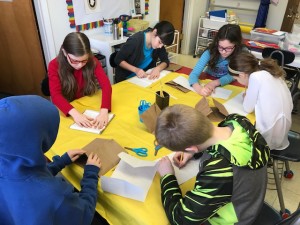 During January, the students learned about the origin and meaning of Native American Dream Catchers. They used wrapped wire to form a circular loom, and then added yarn to create a web pattern to “catch” the bad dreams.The good dreams are allowed through the center of the web and travel down a line of beads and feathers to the person sleeping. It was fun looking at the beautiful and unique dream catchers that everyone made. The students noticed that some of the dream catchers had flower designs like dahlia or sunflower petals, and others had geometrical shapes that looked architectural. Fabulous job everyone!
During January, the students learned about the origin and meaning of Native American Dream Catchers. They used wrapped wire to form a circular loom, and then added yarn to create a web pattern to “catch” the bad dreams.The good dreams are allowed through the center of the web and travel down a line of beads and feathers to the person sleeping. It was fun looking at the beautiful and unique dream catchers that everyone made. The students noticed that some of the dream catchers had flower designs like dahlia or sunflower petals, and others had geometrical shapes that looked architectural. Fabulous job everyone!
The students also learned about an art form of the Nez Perce and Great Plains tribes. The students created a Parfleche, which is an envelope type bag traditionally made from buffalo hide that was used to carry various household goods when the tribe was traveling. The students used geometric designs to decorate a parfleche which they made from brown paper bags. The students will add the leather strings to the bag in February.
We have also enjoyed looking at the amazing portrait drawings that Tamra has made of some of her classmates. And Owen brought in a beautiful collection of a wide variety of Origami pieces that he has been working on at home.
On January 31 and February 7, I will be out of town, and our art substitute Miss Karen will be providing some wonderful lessons on Native American pottery, using real clay and glazes! It would be helpful for the students to bring a clean plastic container (from salad mix or berries, etc.) to transport their clay pieces home when they’re finished.

